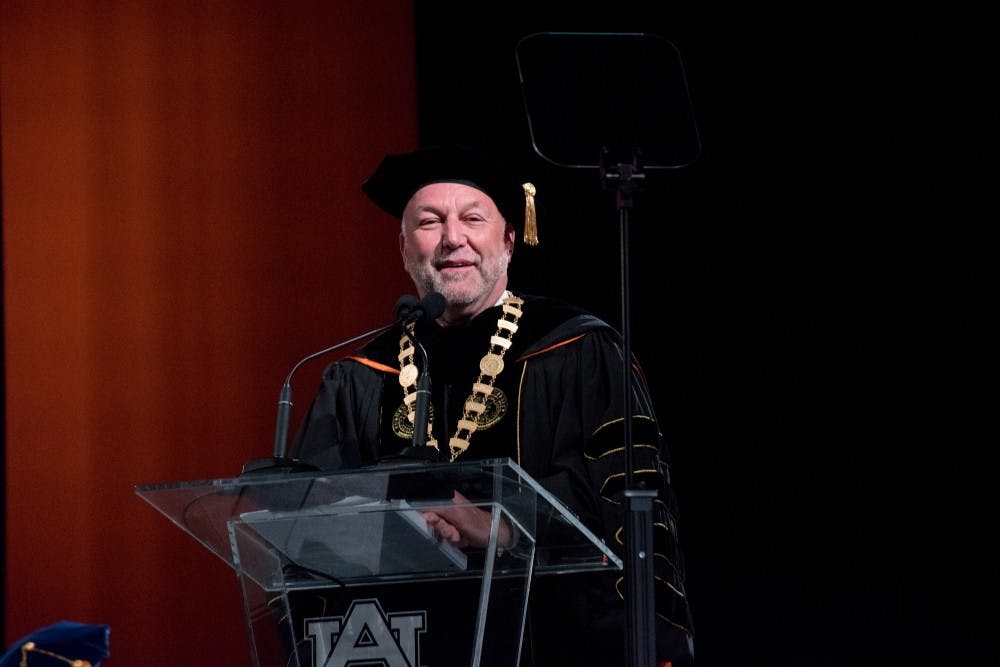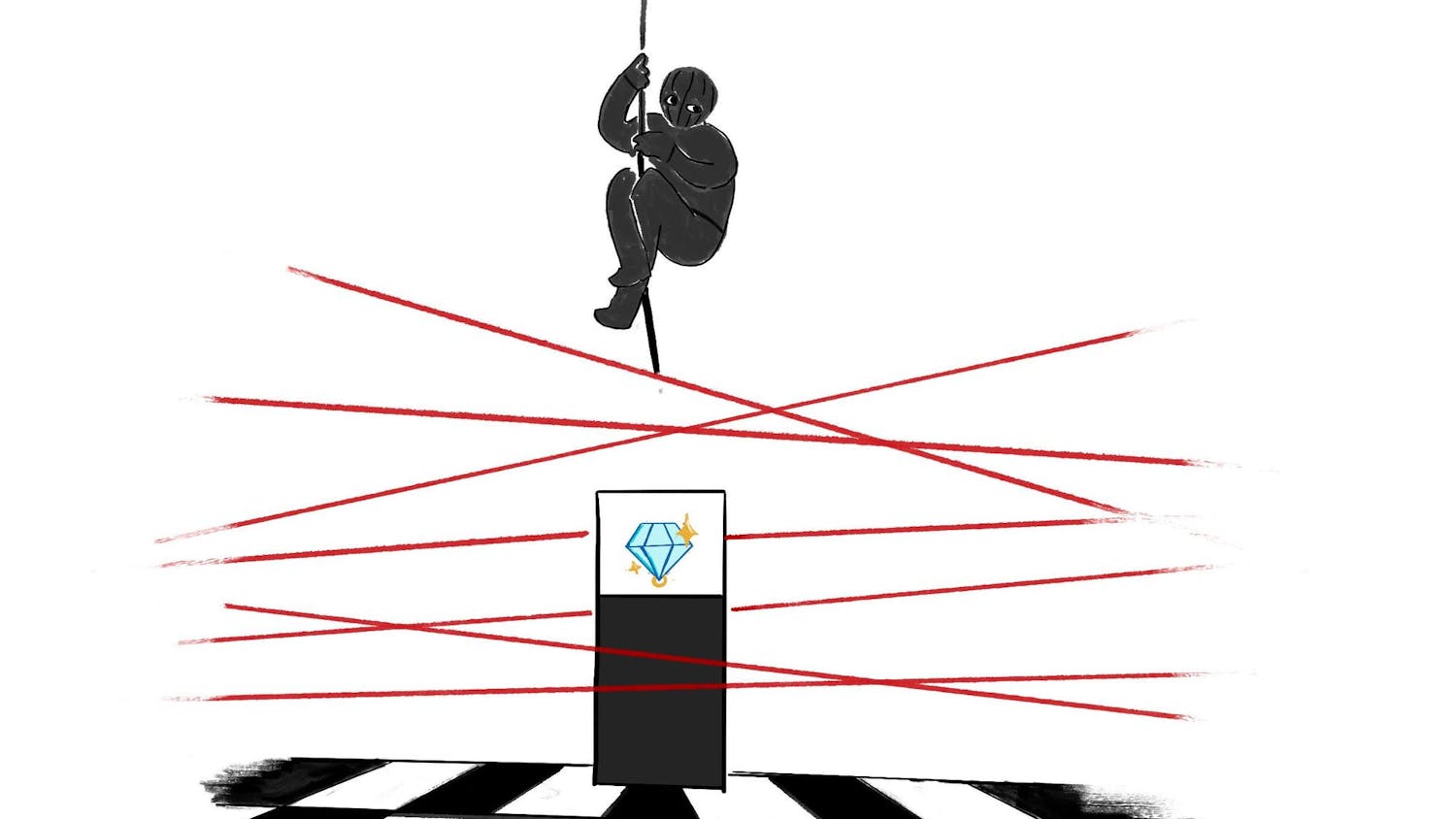Steven Leath, now officially Auburn's 19th president, said the state of Auburn is strong, but strong is not enough to take the University to the next level.
Leath was installed on March 29 in the Auburn Arena. Following former Student Government President Jacqueline Keck, Daniel Svyantek, chair of the University Senate, and Beau Byrd, president of the Auburn Alumni Association, Leath laid out his vision for the future of Auburn University — a future focused on innovation, research, visibility and growth.
"It's a bold vision, and I want it to be crystal clear right from the start," Leath said.
On multiple occasions, Leath expressed his ambitious goals to not only have a meaningful impact on Alabama but the nation and world, as well.
He said with the help of the Board of Trustees, his leadership team and state representatives, the vision for Auburn's future is clear and bright.
"Our vision for Auburn is to become a world-class academic, research, and service university in the true spirit of our land-grant heritage," Leath said.
Leath stressed the importance of acting on the roots of Auburn's land grand institutional foundation and charter. Those chartered tasks include student innovation and growth; scholarship, research and development; and engagement and outreach through leveraging the first two goals.
Education, student growth: Inspire
Leath said the Auburn student experience is "one of the crown jewels" of Auburn's performance. He said in response to "robust faculty-student access," post-graduation statistics are favorable.
That being said, the University will hire more than 500 tenure-track faculty by 2022. The hiring foundation will be based on the University's mission of expanding research and development.
Leath's staff told The Auburn Plainsman that an increase of instructors would allow for growth of the student body, while working toward Leath's research aspirations, as well.
The Office of the President said diversity is valued greatly and they see building a diverse pool of candidates when hiring incredibly important. By announcing the hiring initiative nationwide, Leath and his team see a more diverse applicant pool in the years to come.
Leath said his main priority is students. As a part of the installment schedule, Leath held a Student Celebration on the Green Space on Wednesday, March 28. He mingled with students, addressed the crowd and visited with the organizations who performed and entertained.
What students will be interested to know:
- Plans for new dining options, more parking and additional residence hall capacity. The planning team hopes to be able to eventually accommodate all freshman.
Leath said the University has a responsibility to instill strong work ethic, sound character traits and high values in students during their time on campus.
"We engage students to make valuable contributions to the world they live in and to lead their fellow citizens in creating meaningful change – particularly with respect to those most in need," Leath said.
Research and development: Innovate
Leath said there is room to grow in the areas of scholarship and research. Citing many positive steps toward the goals Leath has set for the University, he said feels the University can do more.
"We need to be more efficient and more streamlined, to be great stewards of our funds, and carefully reinvest those funds in our new priorities. We will earn the reputation as the university that business, industry and governments seek," Leath said.
Reorganization of departments, expanding faculty and increasing allocated funds to better serve research and development is on the table for the upcoming years.
“We will target a broad range of strategically selected disciplines across the university. The strategic planning process led by faculty will to a great extent determine the direction we take," Leath told The Plainsman.
The changes to come in development, research:
- Reseach and economic development have been split into two vice president level roles. Leath said the hope is that the split will "maximize the value of the intellectual property" developed and "accelerate business."
- Auburn Research Park will transform into an Arts and Innovative District with future lifestyle and cultural additions. New facilities will be added to the area. There are three facilities currently in planning, specifically.
- Auburn will begin to work with the Economic Development Partnership of Alabama.
- Plans for new research funding, competitive incentive programs and an expanded graduate student program are in the works.
- Through increasing outreach and engagement initiatives, Leath said Auburn will be in a more tactical position to research and engage private and public partners.
"We will strategically target our areas of research and scholarship in STEM, agriculture and veterinary medicine, among others, but we will also expand into disciplines with clearly identifies promise — such as kinesiology," Leath told The Plainsman. "No area will be overlooked as we assess all possibilities for promising new additions."
Leath said the changes will occur in the next five years. He emphasized that expanding research and sitting on "groundbreaking intellectual property" would not pass in the coming years.
Visibility, marketability, business: Transform
"We will implement the practices and structured processes to convert IP into marketable new products, new therapies and new value-added services to foster the businesses that create jobs here in Alabama," Leath said.
He said a strategic planning process directed by Beth Guertal, professor in environmental science; and Bruce Tatarchuk, professor and director of chemical engineering, will assess on-campus needs. The team will reach out to other faculty and staff to create an overarching perspective.
New facilities, equipment, housing, labs and administrative needs for recruiting will all be assessed in the coming months.
Leath said the University will focus first on the current strength in STEM and agriculture but will not overlook expanding departments.
Leath announced that funding for the many projects ahead is on schedule, noting the funding campaign, "This Is Auburn" that finished 16 months ahead of the initial completion date.
What has been done already:
- Presidential Awards for Interdisciplinary Research were announced; more than 100 proposals submitted in early March.
- New Graduate Research Fellowship program announced.
As the University expands, Leath said he plans to increase Auburn's visibility on a national platform. One of the main priorities of a land grant University is outreach and engagement. Leath said visibility and awareness will put Auburn in the position to reach farther.
"I’m not advocating we brag or boast. That’s not the Auburn way," Leath said. "But there’s nothing wrong with Auburn getting its fair share of well-deserved recognition for our tremendous abilities and accomplishments."
Leath said visibility is critical as hiring presses forward to the goal of 500 tenure-track faculty.
Efforts such as the Critical Conversation series, in which Auburn brings in nationally known speakers and thinkers, are examples of how Leath and his leadership staff plan to increase Auburn's visibility.
During his time at Auburn thus far, Leath has published articles concerning higher education topics on his personal LinkedIn page. Discussions such as these are examples of his personal efforts to warrant discussion — using Auburn as a springboard.
Leath's staff said in addition to conducting foundational scientific research, they will work toward forming partnerships with growing industries.
He reached out to each segment of the University's make-up, from staff and students, to the Auburn Family and the University's business partners — pushing each group toward a higher level.
Leath closed with a quote from former President John F. Kennedy:
“We choose to go to the moon. We choose to go to the moon in this decade and do the other things…Not because they are easy, but because they are hard…Because that goal will serve to organize and measure the best of our energies and skills…Because that challenge is one that we are willing to accept, one we are unwilling to postpone, and one which we intend to win…”
And a "War Eagle."
Do you like this story? The Plainsman doesn't accept money from tuition or student fees, and we don't charge a subscription fee. But you can donate to support The Plainsman.





